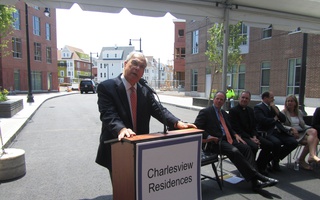Speaking at the Harvard-Allston Task Force meeting Wednesday night, Allston residents criticized Harvard’s proposed relocation of some campus services, a move which they say intrudes into a residential area.
About 75 members of the Allston-Brighton community packed into a Business School lecture hall for the meeting, which also touched on University-funded community benefits in Allston and mixed-use developments at Barry’s Corner.
Kevin Casey, Harvard’s associate vice president for public affairs and communications, spoke about Harvard’s intentions for its land in the neighborhood and fielded questions about the University’s plans for construction and its commitment to community benefits.
Casey kicked off the meeting by addressing the University’s decision to relocate the School of Engineering and Applied Sciences to the planned science complex across the Charles River, a move which University President Drew G. Faust announced at a faculty meeting on Tuesday. Casey said that Harvard will not, as some residents feared, build a development for SEAS beyond the bounds of the proposals it has already submitted to the city of Boston.
Some residents argued that while the University is being very specific about plans for its own buildings, it has been much less forthcoming with details of projects intended to benefit the community, such as the Education Portal.
The conversation became particularly heated when it turned to Harvard’s plan to move some of its facilities from 219 Western Ave. to 28 Travis St. Critics took issue primarily with Harvard’s plan to relocate its “fleet management” services to the Travis Street site, which is adjacent to several residential lots. Residents requested that it be moved elsewhere, saying they were worried the plan would increase noise, traffic, and pollution in the neighborhood.
“Harvard is proposing to move a maintenance facility on the periphery of our neighborhood into our neighborhood,” said Allston resident Paul “Chip” Alfred.
The campus services that would be housed at 28 Travis St. would include mailroom and information technology services, a Harvard police training area, and recycling, storage, and fleet management services.
Casey said that the Travis Street location is the only viable place for the facilities and described changes to the plans that he said will address residents’ concerns. A new building for vehicle management, Casey said, will act as a buffer between homes and the loading zones, while a new layout will close off access to Travis Street from the loading area, doubling green space along the road and lessening noise and traffic for the homes across the street.
Still, some residents were not satisfied with the University’s proposed solution.
“You would walk your children next to a park with all of that?” Alfred asked.
The relocation is part of much larger series of plans for Allston that include the construction of a new science complex, a new basketball arena, a hotel and conference center, and other academic and administrative buildings. Harvard first filed a proposal for development with the city in 2007, but halted construction in 2009 because of the economic downturn, a move which angered residents in Allston and Brighton.
Harvard announced last summer that it would resume development in the neighborhood and has since filed new, shorter-term plans than the ones it pursued before the recession.
—Staff writer Marco J. Barber Grossi can be reached at mbarbergrossi@college.harvard.edu. Follow him on Twitter @marco_jbg.
—Staff writer Samuel Y. Weinstock can be reached at sweinstock@college.harvard.edu. Follow him on Twitter @syweinstock.
Read more in News
Lacking Space, SEAS Plans Allston ExpansionRecommended Articles
-
Allston Students Face Two WorldsHolm, from Allston, says there has developed a dissonance between loving her school and having a deep personal knowledge of the impact it has had on her neighborhood.
-
McCluskey, Liaison Between Harvard and Allston, To DepartKevin A. McCluskey ’76 has acted as Harvard's envoy to the Allston community during a period of fraught relations between the University and the neighborhood.
-
Students Support Long-Awaited Library in ChinatownAn advocacy program launched by six Harvard undergraduates plans to provide programming focused on storytelling, mentoring, and computer literacy to the Chinatown Cultural Center.
-
 Charlesview Residences Open for Residents Ahead of Schedule
Charlesview Residences Open for Residents Ahead of Schedule -
University Files Institutional Master Plan for Development in AllstonThe 275-page document, a draft of which was filed last October, details plans for approximately 1.4 million square feet of new construction and 500,000 square feet of renovation.
-
Allston Residents Debate Renaming Historic “Barry’s Corner”Allston residents disagree on what to name the intersection of North Harvard Street and Western Avenue, an area destined to be the retail and residential hub of Harvard’s development in Allston over the next ten years.













